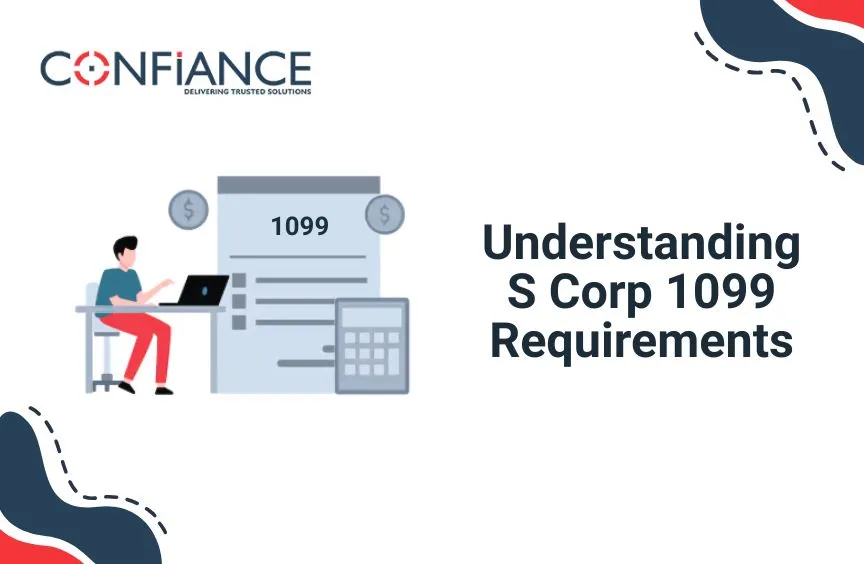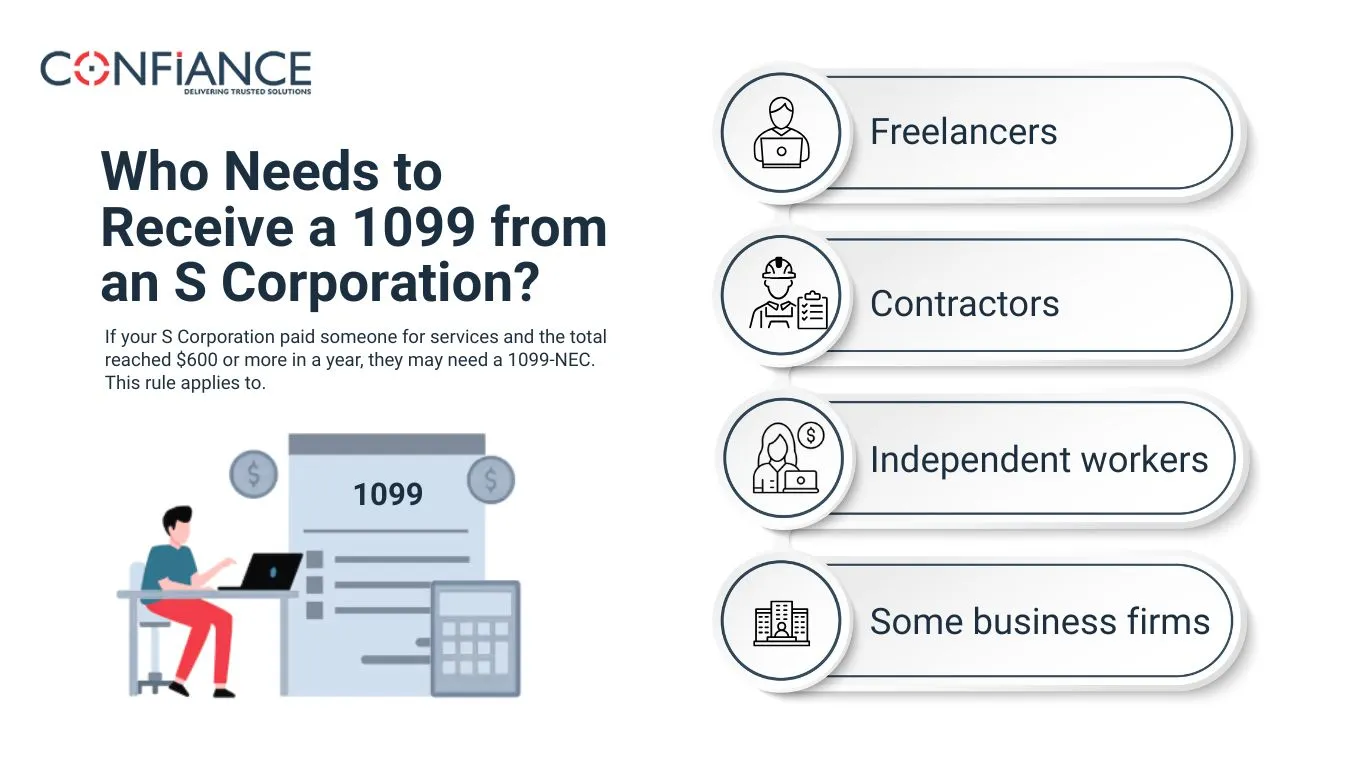
Understanding S Corp 1099 Requirements
Every business must follow tax rules. S Corporations have specific duties. One of them includes sending Form 1099 when required. If your S Corporation pays vendors or contractors, you need to understand the s corp 1099 requirements.
Getting this wrong can cost money. It may lead to notices, penalties, or audits. Knowing when to send a 1099, to whom, and how, is not just helpful—it is necessary. This guide explains the full process. It covers forms, rules, duties, and common mistakes.
What is an S Corporation?
An S Corporation is a business structure that passes income and tax items to its owners. The business itself does not pay tax at the federal level. Owners report the business income on their own tax returns.
Even though S Corporations avoid double tax, they are still treated as separate legal entities. That means they must follow the same IRS rules as other businesses. One of those rules involves sending Form 1099 to people or firms they pay.
What is Form 1099?
Form 1099 helps the IRS track income that is not from wages. There are different types of 1099 forms. The most common one is Form 1099-NEC. NEC stands for non-employee compensation.
If your S Corporation paid a person or business $600 or more during the year for services, you may need to send this form. The form goes to both the IRS and the person or firm who received payment.
The s corp 1099 requirements are not complex, but they must be followed with care.
Who Needs to Receive a 1099 from an S Corporation?
If your S Corporation paid someone for services and the total reached $600 or more in a year, they may need a 1099-NEC. This rule applies to:

- Freelancers
- Contractors
- Independent workers
- Some business firms
You must also check the structure of the vendor. If the payee is a sole owner, partnership, or LLC taxed as one of those, you must send the form. If the vendor is a corporation, the rules may be different.
Are There Exceptions?
Yes. S Corporations do not need to send 1099 forms for every payment. Here are the common exceptions:
- Payments to C Corporations
- Payments for goods or products
- Payments made by card or PayPal
- Payments under $600
- Payments to tax-exempt firms
However, some corporations still need to receive 1099s. If you pay a law firm or medical company, you must send the form even if they are a corporation.
This is a key part of the s corp 1099 requirements. Many firms miss this and face issues.
What is the $600 Rule?
If you pay $600 or more to a vendor or contractor during the year, you must send them a 1099-NEC. This rule covers:
- Fees
- Commissions
- Wages to non-employees
- Bonuses
- Awards
Keep good records of payments. Total them before the year ends. If they reach or cross $600, file the form.
Do not wait until the year ends to check. Track your payments monthly. That makes filing easier.
Do S Corporations Receive 1099s?
This is where many people get confused. Most payments made to an S Corporation do not need a 1099. But there are exceptions.
If an S Corporation is paid for legal work or medical services, the payer must send a 1099. So, if your S Corp is in law or health, you may still get one.
The rules are based on the type of service, not just the business form.
What About Paying Yourself?
If you own the S Corporation and take a wage, that goes on a W-2 form. But if you also do outside work for the firm, and are paid for that, you may need a 1099. This is rare and depends on how the payment is set up.
Wages are not reported on 1099s. They are reported using payroll forms.
This is a fine detail of the s corp 1099 requirements. Speak to a tax expert if your case is not clear.
What is the Role of Form W-9?
Form W-9 is used to collect key details from vendors and service providers. Before you pay anyone for services, ask them to fill out a W-9. This form gives you:
- Full legal name
- Business name if any
- Address
- Type of entity
- Tax ID number
Without a W-9, you cannot complete the 1099. It also helps you avoid backup withholding. Always ask for a W-9 before you pay someone. Keep it in your records.
When to File Form 1099
The form must be sent to the person or firm by January 31. The same form must be sent to the IRS by the same date.
You can send the form by mail or use an electronic system. If you file more than 10 forms, you must file online.
Use certified mail if sending by post. This helps if there are disputes later. Keep a copy of each form.
What is Form 1096?
If you file by paper, you must include Form 1096. This is a summary of all 1099 forms you are sending. It tells the IRS how many forms you are filing and what type.
If you file online, you do not need Form 1096. Use IRS systems or private e-filing services.
Can You Use Accounting Software?
Yes. Many software tools support 1099 filing. These include:
- QuickBooks
- Xero
- Zoho
- Wave
- FreshBooks
Using software helps you avoid mistakes. It can track payments, match names, and auto-fill forms. Choose a system that fits your business size and budget.
This can help you meet s corp 1099 requirements on time.
Common Mistakes to Avoid
Here are mistakes S Corporations often make:
- Not collecting W-9s before payment
- Sending forms to the wrong address
- Missing the January 31 deadline
- Sending forms to firms that do not need them
- Not tracking total payments through the year
- Using the wrong form type
Each mistake can cost money. Some can trigger audits. Review your vendor list each year. Check each one before the year ends.
What if You Forget to File?
If you forget to send a 1099, fix it right away. File the form as soon as you find the error. The IRS has penalties based on how late you file. Penalties range from:
- $60 per form if filed within 30 days
- $120 per form if filed by August 1
- $310 per form if filed after August 1
If you show a valid reason for delay, the IRS may waive the fine. But this is not a guarantee.
What is Backup Withholding?
If a vendor does not give you a Tax ID, you must withhold part of the payment. This is called backup withholding. The current rate is 24 percent.
Send this amount to the IRS. Report it using other forms. Backup withholding is required by law when details are missing or incorrect.
The s corp 1099 requirements stress this point. Always get the right info before paying a vendor.
Can You Send 1099s Electronically?
Yes. But the receiver must agree to this. You need written permission from them. If they prefer mail, send the form to their postal address.
Electronic forms must be in a safe, readable format. Always get the consent before sending. Keep a copy of the permission with your files.
Do Foreign Vendors Get 1099s?
Most foreign vendors do not need to get a 1099. But you must confirm where they live and where the work was done.
If they work outside the US and are not citizens, they may be exempt. Ask them to fill out Form W-8BEN. This proves their status.
Foreign taxes and treaties add extra layers. If your S Corp works with overseas vendors, talk to a tax expert.
Why the IRS Cares About 1099s
The IRS uses 1099 forms to check income reporting. If your S Corp paid someone, and they did not report it, the IRS will catch it.
1099 forms help prevent tax fraud. They also create a clear paper trail for your firm. Meeting the s corp 1099 requirements keeps your business safe from extra review.
Summary of S Corp 1099 Requirements
Let’s review the key points:
- File 1099-NEC for payments of $600 or more for services
- Collect a W-9 before making payments
- Do not file for payments to most corporations
- Always file for law firms and medical services
- Send forms by January 31
- Use Form 1096 if filing by paper
- Use software to track and file
- Avoid errors and late filing
- Respect backup withholding rules
- Keep full records of each payment and form
The IRS expects full compliance with the s corp 1099 requirements. Do not wait until tax season to start. Track your payments during the year. Collect the right forms. Know which vendors need reporting.
If you are not sure about a payment, check the rules. A small mistake today can cause a large problem later. Keep your records clean. File on time. Avoid fines and audits by following the rules. Confiance can help you comply with all the legal S Corp requirements. Contact us now and get help with your S Corp formation.
FAQs
- Are S Corporations required to file 1099 forms?
Yes. If they pay $600 or more for services during the year to a person or firm that is not a corporation, they must file. - Do I need to send a 1099 to a law firm?
Yes. Even if the law firm is a corporation, you must send the form if you paid $600 or more. - What is the deadline to file 1099-NEC?
You must send it to both the person and the IRS by January 31 each year. - Do payments by credit card need a 1099?
No. The payment processor will report those using Form 1099-K. - Is a 1099 required for rent?
Yes, if you pay $600 or more in rent to a person or non-corporate entity, you must file Form 1099-MISC. - Can I file 1099s online?
Yes. If you file 10 or more forms, online filing is required by the IRS.
